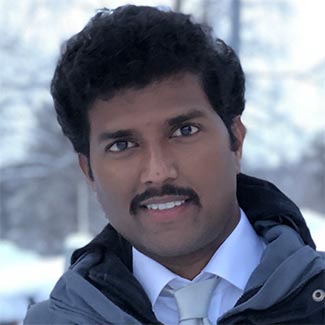
Kiran
Garimella
Assistant Professor of Library and Information Science
- Office:
- Huntington House 204
- EMAIL:
- kg766@rutgers.edu
- WEB LINKS:
- Google Scholar Personal Website
Kiran Garimella’s research deals with using large-scale data to tackle societal issues such as misinformation, political polarization, or hate speech. Prior to joining Rutgers, Garimella was the Michael Hammer postdoc at the Institute for Data, Systems and Society at MIT. Before joining MIT, he was a postdoc at EPFL, Switzerland. His research focuses on using digital data for social good, including areas like polarization, misinformation and human migration. His work on studying and mitigating polarization on social media won the best student paper awards at ICWSM 2021, WSDM 2017, and WebScience 2017. Kiran received his Ph.D. in computer science at Aalto University, Finland, and Masters & Bachelors from IIIT Hyderabad, India. Prior to his Ph.D., he worked as a Research Engineer at Yahoo Research, Barcelona, and QCRI, Doha.
Education
Aalto University
Ph.D., Computer Science
IIIT Hyderabad
Master of Science , Computer Science
Research
Garimella's research interest is in the area of Computational Social science, which contributes to the understanding of large-scale human behavior on social networks based on solid theoretical foundations from computer science and uses this understanding to solve critical societal problems of our time. He pursues this goal by developing a unique end-to-end research methodology, which can be summarized under two main categories: (i) conducting inter-disciplinary research that is based on solid formalisms & analysis, developing ethically responsible algorithmic techniques to collect and analyze societal problems such as political polarization, misinformation and human migration at scale; (ii) building tools to showcase the applicability of the developed techniques on real data and enable researchers from other disciplines such as political science, demography, and journalism to easily access the data and methods. He currently has three main lines of work:
- Polarization on Social Media: Garimella's Ph.D. research focused on one of the key societal problems we face, political [or social] polarization. Polarization refers to the segregation within a society that may emerge from differences in opinion on various topics. Increased polarization in the society leads to balkanization, where groups of people enclose themselves in their own bubbles, leading to less deliberation and discussion, which might be dangerous for a democracy. His work contributes to designing a comprehensive algorithmic framework for identifying, tracking the evolution of, and reducing online polarization.
- Misinformation: One of his primary interests in the past few years has been in studying chat-based messaging platforms such as WhatsApp and Telegram. These platforms are hard to access and monitor because of their private nature, lack of a public API, and end-to-end encryption. However, platforms like WhatsApp are important components of social media especially in the global south, used by over 2 billion users every month. There have been high-profile incidents of rumors killing dozens of people in India, or widespread election manipulation through WhatsApp in Brazil. The COVID-19 pandemic has exacerbated such concerns with rampant health misinformation. Due to their encrypted and private nature, there is currently no way of knowing how bad the problem is until we see real-world consequences such as people getting killed or election manipulation. Garimella's research fills the critical gaps in understanding these closed messaging applications.
- Computational Demography: The idea of using computational techniques for solving societal challenges also applies very well to demography, where traditionally, lack of access to data is a big issue. Survey data is of high quality, but is expensive to obtain and is only available once in a few years. Moreover, some countries, especially in the global south do not have demographic statistics due to a lack of resources. To mitigate these problems, he has been working on enabling the use of digital data sources to study demographic issues such as migration through compiling diverse data sources as well as several problems that arise in this domain.
For a full list of his publications visit: https://users.ics.aalto.fi/kiran/publications.html
Research Groups
Selected Publications
Claim Matching Beyond English to Scale Global Fact-Checking, with Ashkan Kazemi, Devin Gaffney, and Scott Hale, ACL 2021.
"Short is the Road that Leads from Fear to Hate": Fear Speech in Indian WhatsApp Groups with Punyajoy Saha, Binny Mathew, and Animesh Mukherjee, The Web Conference 2021
Surfacing norms to increase vaccine acceptance with Alex Moehring, Avinash Collis, Amin Rahimian, Dean Eckles, and Sinan Arai.
Political Polarization in Online News Consumption with Robert West, Rebecca Weiss, Tim Smith, ICWSM 2021.
Garimella, K., & Eckles, D. (2020). Images and misinformation in political groups: Evidence from WhatsApp in India. Harvard Kennedy School Misinformation Review.